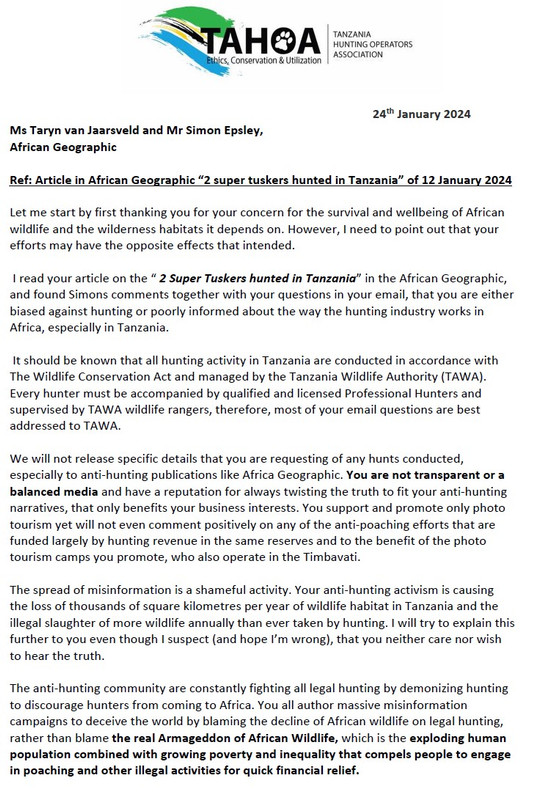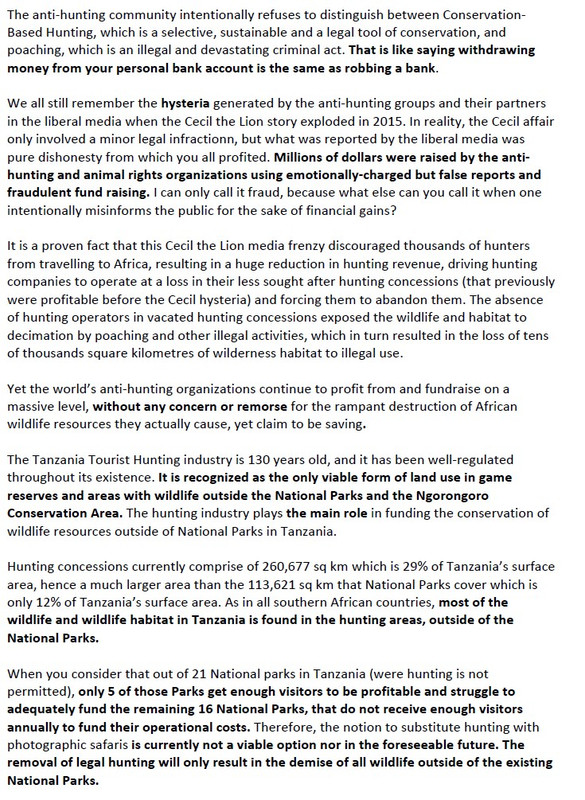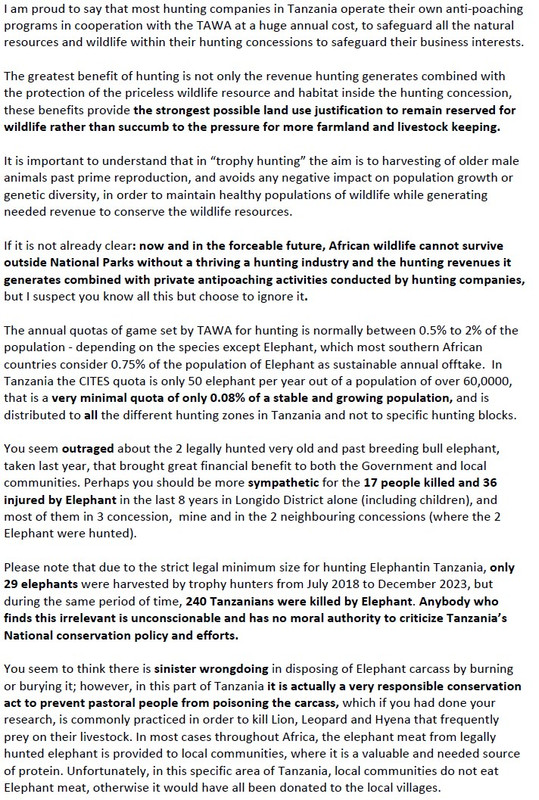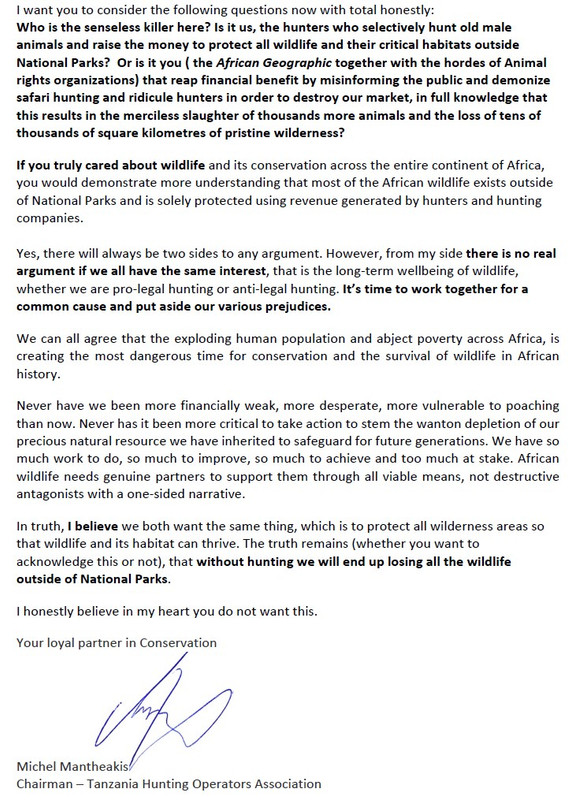

 The Accurate Reloading Forums
The Accurate Reloading Forums  THE ACCURATE RELOADING.COM FORUMS
THE ACCURATE RELOADING.COM FORUMS  Hunting
Hunting  African Big Game Hunting
African Big Game Hunting  2 Super Tuskers were hunted in Tanzania near the border to Kenya
2 Super Tuskers were hunted in Tanzania near the border to KenyaGo  | New  | Find  | Notify  | Tools  | Reply  |  |
| One of Us |
2 Super Tuskers were hunted last year West of the Kilimanjaro NP near the border to Kenya and somebody is not so Happy with it... https://africageographic.com/s...tuskers-in-tanzania/ Nec Timor Nec Temeritas | ||
|
| One of Us |
Any truth in the statement "the hunters burnt the elephant carcasses" ?? I'm sure somebody here knows more of the backstory to these hunts ( if these were genuine hunts, not poaching ). If so, could anything be divulged ? I'm left wondering why carcasses would be burnt if these bulls were legally hunted. Hunting.... it's not everything, it's the only thing. | |||
|
| One of Us |
I agree that burning the carcasses seems awfully odd. I have been on a lot of elephant hunts. I have never seen that done before. I wonder just how much of this is true. It would be interesting to know the companies involved. | |||
|
| One of Us |
They were legally hunted. TZ folks chime in.. | |||
|
| One of Us |
I remember reading in one of Boddington's books (Tracks Across Africa, I believe) that after taking an elephant, Michel Mantheakis "sanitizes" the area by burning the Ele carcass after the meat is taken off. The idea was to keep other Ele in the area calm. Makes sense. | |||
|
| One of Us |
"24 & 36 KM from the Kenya border"... Is that supposed to be a bad thing? "There are unconfirmed reports that the hunting operator identified the specific super tusker while the elephant was outside the hunting block and targeted the elephant shortly after it crossed into the hunting zone." As long as these were legal hunts on animals in the hunt zone (on their own accord) then congrats to the operator, PH and hunter. | |||
|
| One of Us |
If they don't burn the carcasses, the Masai will poison them and kill all manner of predators. Masai don't want the meat. | |||
|
| One of Us |
We did the same in Zim in May on both elephant for the same reasoning. To clarify, carcass was nothing more than picked clean bones and bowel contents. | |||
|
| One of Us |
It’s done in the Caprivi also. Vote Trump- Putin’s best friend… To quote a former AND CURRENT Trumpiteer - DUMP TRUMP | |||
|
| One of Us |
That is correct but will add that the entire carcass was dismembered leaving NOTHING but a pile of undigested grass and the obvious large amount of blood. The "bits and pieces" were loaded in a 5 ton truck and taken to the nearest village for distribution. | |||
|
| Administrator |
I don't know how many elephants I have shot. We have never burnt anything. Everything is utilized! Only thing ever left behind is the gut content! | |||
|
| One of Us |
lavaca posted 17 January 2024 15:00 Hide Post If they don't burn the carcasses, the Masai will poison them and kill all manner of predators. Masai don't want the meaat. Brandon.Gleason posted 17 January 2024 15:00 Hide Post quote: We did the same in Zim in May on both elephant for the same reasoning. To clarify, carcass was nothing more than picked clean bones and bowel contents. Given the above I can see the reasons for burning, after meat recovery, and it seems sensible. I learned something. I had never heard of this being done. The Geographic article certainly doesn't make this clear and the way they express it one could think, as I did, that burning of an entire carcass was done to conceal something shameful. I would be very surprised if local villagers would allow that anyway. If they were denied any chance to take meat from a kill because it was going to be set on fire I would think there would be an instant riot. Hunting.... it's not everything, it's the only thing. | |||
|
| One of Us |
That would depend on geographical locations and customs as not all indigenous Africans consume elephant meat. It would also take a LOT of firewood and time to burn an entire (intact) carcass and expect the results of a cremation (ashes to ashes) and achieve "sanitation" expectations of the kill zone. The quickest and effective way of doing it is by a total dismembering of the carcass and firing the area with light scrub to eliminate the smell of death the Mantheakis way. All said and done, this sanitation process is usually conducted in an area where there are resident populations of elephant that one wants to be left undisturbed as they might leave the area entirely and maybe reappear several months or years later. The 2 "super tuskers" would not apply to such a situation as they would very likely have been "nomadic" and their attempted "cremation" was probably aimed at disguising their demise by keeping vultures out of the skies, one of the primary signs to rangers that lunch is being served. | |||
|
| One of Us |
In the Caprivi, the burning was done after the villagers had taken all the meat and nothing but bones and scraps were left. Kerosene was used IIRC. Vote Trump- Putin’s best friend… To quote a former AND CURRENT Trumpiteer - DUMP TRUMP | |||
|
| One of Us |
I have learned something. I have never seen or heard of the burning before . | |||
|
| One of Us |
Same here Larry. My single Jumbo was in the Mababe depression in Botswana. We were very near the village of Mababe as well. After the kill, Zero locals came for meat…none. The carcass just sat there and rotted. The days following,I killed a Hyaena off of it. There were un-countable vultures and Maribu storks on it. The burning certainty makes sense to me. Formerly "Nganga" | |||
|
| One of Us |
For those paying attention TZ is making a bit of an elephant comeback. Not all areas to be sure, though most if not all areas are seeing increased numbers. Masailand, Maswa North and areas around Ruaha NP were not hit as hard,or at all, by the poaching wave that ended about 2014 and have been producing some really good bulls of late. | |||
|
| One of Us |
The operator I hunted with in Botswana last year said the same thing. They will burn the carcasses, AFTER all meat and everything is removed, to sanitize the area. They did not do it while I was there, so I assume staff did it later. We were pretty busy after the elephant trying to get on a leopard, then we moved to a different area after leopard | |||
|
| One of Us |
From what I heard, which makes sense. The Masai do not eat wildgame, I know this for a fact because when we gave them two buffalo they were least interested! So instead of letting the carcasses rot they burnt them so that they would not attract lions etc which then the Masai would have poisoned to guard against their livestock! Arjun Reddy Hunters Networks | |||
|
| One of Us |
I spent many years running a hunting camp in Masailand - Simanjiro and have never seen or heard of any carcass being incinerated what with firewood being a scarce commodity. We didn't and don't leave buffalo carcasses lying around either as the meat is consumed by the camp staff and the Masai living in the camp vicinity. We had in the recent past also shot several elephants and the carcasses (some people call them corpses) were left to rot as there was a shortage of Hyenas and Vultures thanks to the poisoning of carcasses by the same Masai. | |||
|
| one of us |
After 3 100 pounders were hunted in those same areas back in 1993 (IIRC), under unclear circumstances, a dispute arose between teh wildlife Ministries of Kenya and Tanzania. The result? A moratorium was introduced in 1994 on elephant hunting within a certain distance of the international border (150km IIRC). No elephant hunting permits have been issued since 1994 for hunting blocks along this border. The fact that the first 2 elephants hunted in over 26 years in these areas, resulted in 2 hundred pounders does make me raise my eyebrows. No announcement was made to the effect that the ban on elephant permits in those areas was lifted. Draw your own conclusions. If the clients are from the US, I bet they will struggle to get USFWS to issue them an import permit for the USA. "...Them, they were Giants!" J.A. Hunter describing the early explorers and settlers of East Africa hunting is not about the killing but about the chase of the hunt.... Ortega Y Gasset | |||
|
| one of us |
Some of this is very interesting. We hunted around Lake Natron quite a few years ago. The Masai we happy to take some meat from the wildebeest we shot there. Perhaps the Masai don't have the skill or will to cut the meat from a whole buffalo in strips for drying. Mark MARK H. YOUNG MARK'S EXCLUSIVE ADVENTURES 7094 Oakleigh Dr. Las Vegas, NV 89110 Office 702-848-1693 Cell, Whats App, Signal 307-250-1156 PREFERRED E-mail markttc@msn.com Website: myexclusiveadventures.com Skype: markhyhunter Check us out on https://www.facebook.com/pages...ures/627027353990716 | |||
|
| One of Us |
Didn’t this moratorium have a 20 year life ? | |||
|
| One of Us |
Wow, so Kenya bans hunting.... then managed to get an Elephant hunting ban in the units that touch their border? That's handy. Maybe now they should work to get a ban in the units that touch the units that touch their border, and so on. | |||
|
| One of Us |
I have a letter from Michel Mantheakis on behalf of the Tanzania Operators Association (TAHOA) to African Geographic on their article on this issue. I thought it was well done and struck a balance between confrontation and looking for common ground. I think you would enjoy reading it. My problem is I have it in PDF. I am not technologically sophisticated enough to share it on the forum. Can anyone help me with that? | |||
|
| One of Us |
Here's the letter:     Leopard, Hippo, Croc - Zambezi Valley, Zimbabwe, 2024 Reindeer & Geese, Iceland, 2023 Plains Game, Eastern Cape, 2023 Buff - Zambezi Valley, Zimbabwe, 2022 Muskox-Greenland, 2020 Roe buck and muntjac in England, 2019 Unkomaas Valley, RSA, 2019 Kaokoland, Namibia, 2017 Wild boar hunting in Sweden, 2016 Moose hunting in Sweden, 2014 How to post photos on AR | |||
|
| One of Us |
Hannay, Thanks. | |||
|
| One of Us |
Listened to a Blood Origins podcast today regarding these hunts. I sincerely hope that some of the rumors about the hunts, i.e., that a helicopter may have used to move at least one elephant into a hunting area, are unfounded and incorrect. While I certainly understand the rationale behind not releasing specific details regarding the hunts, I do worry that it may allow those with agendas to continue to spread misinformation. Mike | |||
|
| One of Us |
I have no information on the hunts, the hunters or the bulls involved, but that sounds like a pretty outrageous charge about helicopters. | |||
|
| One of Us |
What seems odd to me is that if that information is out there and it is a rumor, why not just issue a denial? Despite the letter saying there will not be a release of specific information regarding the hunts, the letter goes on to address the carcass burnings but not the contention about a helicopter being used. I only know what I heard on the podcast but all three participants on podcast were familiar with the helicopter rumor. I hope it is rubbish. Mike | |||
|
| One of Us |
Mike, we are dealing with antis, who are about as honest as the Biden Administration. You can't believe anything they say. Michel's company had nothing to do with the hunts, he is writing on behalf of the association, but I'll try to find out more. What this looks like to me is some old beyond breeding bulls wandering across an international boundary that means nothing to them. And their harvest means nothing to elephants. I'm confident no rules were broken, but I'll certainly ask. | |||
|
| One of Us |
It's a good letter, but will fall on deaf ears with antis I'm afraid. I was just wondering about this quote.
Has that happened in Tanzania? Which areas? Has it happened elsewhere? Zim? Zam? Moz? Nam? | |||
|
| One of Us |
What's that Sun Tzu quote - the enemy tells you how he is to be destroyed? Or someghing like that... | |||
|
| One of Us |
I have it on good authority that no helicopters were involved and that is a complete fabrication by the antis. These bulls were fairly hunted and they worked for them. Agree the antis will never be reasonable or engage in reasonable dialogue, so it makes no sense to share details with them, they will only twist them around and try to use them against you. I love that area and have to go back if USF&W changes their stance on imports of ivory from Tanzania. | |||
|
| One of Us |
That’s good news. I sincerely hope the information is correct. Mike | |||
|
| One of Us |
I'd bet my life on it. | |||
|
| One of Us |
Makes sense. The left "never lets a good crisis go to waste" so therefore: trot the rumor out again & again. By the time the truth comes out, put that on the bottom of page 44 (if forced) & 99% still thinks a helicopter was used. Back to my 2nd post here: As long as these were legal hunts on animals in the hunt zone (on their own accord) then congrats to the operator, PH and hunter. | |||
|
| One of Us |
I bet it will happen if TZ stays the course. 100 pounders in Longido. | |||
|
| One of Us |
Safari2, exactly where I had in mind. | |||
|
| one of us |
https://bnnbreaking.com/wildli...-hunting-in-tanzania Cross-Border Controversy: The Debate Over Elephant Hunting in Tanzania Discover the controversy surrounding the recent hunting of elephants near Amboseli National Park, sparking debates on wildlife conservation, community benefits, and ethical considerations in East Africa. BNN Correspondents 21 Feb 2024 18:09 EST Updated On 22 Feb 2024 11:03 EST Cross-Border Controversy: The Debate Over Elephant Hunting in Tanzania As dawn breaks over the savannah, the gentle giants of Amboseli move silently, unaware they are at the heart of a heated controversy that transcends national borders. The recent hunting of two large elephants near Kenya's Amboseli National Park in Tanzania has ignited a firestorm of debate, drawing criticism from conservationists and prompting a closer look at the intricate balance between wildlife conservation and community benefits in the region. This story isn't just about the hunted; it's a narrative entwined with the socio-economic, legal, and environmental fabric of East Africa. The Heart of the Controversy At the center of the storm is a report from Africa Geographic, vehemently criticizing the hunting of elephants that typically migrate between Kenya and Tanzania. These aren't just any elephants; they're described as friendly giants, accustomed to the presence of humans and less likely to flee from hunters. The killing of these elephants so close to the Kenyan border has sparked a fierce debate over wildlife ownership and the ethics of hunting animals that are considered national treasures by neighboring countries. Professor Adam Hart and Dr. Ladislaus Kahana, staunch defenders of hunting, argue it's a necessary conservation tool that benefits local communities and deters poaching. In contrast, critics see it as a threat to wildlife conservation and ethical treatment of animals. A Legal and Economic Perspective Michel Mantheakis, chairman of the Tanzania Hunting Operators Association (TAHOA), steps into the fray with a defense of the legality and regulation of hunting in Tanzania. Mantheakis emphasizes the crucial role of hunting in funding conservation efforts outside national parks and its historical significance in the region. He sheds light on the challenges faced by local communities, including fatalities and injuries from wildlife encounters, underscoring the complex relationship between humans and wildlife in Tanzania. Despite the benefits touted by proponents, the anti-hunting movement accuses the industry of spreading misinformation and undermining the tangible positive impacts of regulated hunting on wildlife conservation. Conservation or Controversy? The debate over the hunting of the Amboseli elephants raises broader questions about the effectiveness of hunting as a conservation tool. While Tanzania champions regulated hunting for its socio-economic benefits and role in preventing poaching, critics argue that the practice may do more harm than good, especially for species like elephants that are already under threat. The controversy also highlights the challenges of managing wildlife that roam across national borders, where conservation policies may clash. As this debate unfolds, it's clear that finding a balance between conservation efforts and the needs of local communities will be crucial in shaping the future of wildlife management in East Africa. Kathi kathi@wildtravel.net 708-425-3552 "The world is a book, and those who do not travel read only one page." | |||
|
| Powered by Social Strata | Page 1 2 3 4 5 |
| Please Wait. Your request is being processed... |
|
 The Accurate Reloading Forums
The Accurate Reloading Forums  THE ACCURATE RELOADING.COM FORUMS
THE ACCURATE RELOADING.COM FORUMS  Hunting
Hunting  African Big Game Hunting
African Big Game Hunting  2 Super Tuskers were hunted in Tanzania near the border to Kenya
2 Super Tuskers were hunted in Tanzania near the border to Kenya

Visit our on-line store for AR Memorabilia

